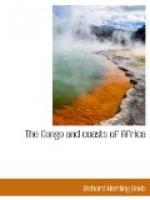Next morning I left for Leopoldville in a boat much larger than the Deliverance, but with none of her cheer or good-fellowship. This boat was run by the black wife of the captain. Trailing her velvet gown, and cleaning her teeth with a stick of wood, she penetrated to every part of the steamer, making discipline impossible and driving the crew out of control.
I was glad to escape at Kinchassa to the clean and homelike bungalow and beautiful gardens of the only Englishman still in the employ of the State, Mr. Cuthbert Malet, who gave me hospitably of his scanty store of “Scotch,” and, what was even more of a sacrifice, of his precious handful of eggs. A week later I was again in Boma, waiting for the Nigeria to take me back to Liverpool.
Before returning to the West Coast and leaving the subject of the Congo, I wish to testify to what seemed to me the enormously important work that is being done by the missionaries. I am not always an admirer of the missionary. Some of those one meets in China and Japan seem to be taking much more interest in their own bodies than in the souls of others. But, in the Congo, almost the only people who are working in behalf of the natives are those attached to the missions. Because they bear witness against Leopold, much is said by his hired men and press agents against them. But they are deserving of great praise. Some of them are narrow and bigoted, and one could wish they were much more tolerant of their white brothers in exile, but compared with the good they do, these faults count for nothing. It is due to them that Europe and the United States know the truth about the Congo. They were the first to bear witness, and the hazardous work they still are doing for their fellow men is honest, practical Christianity.




